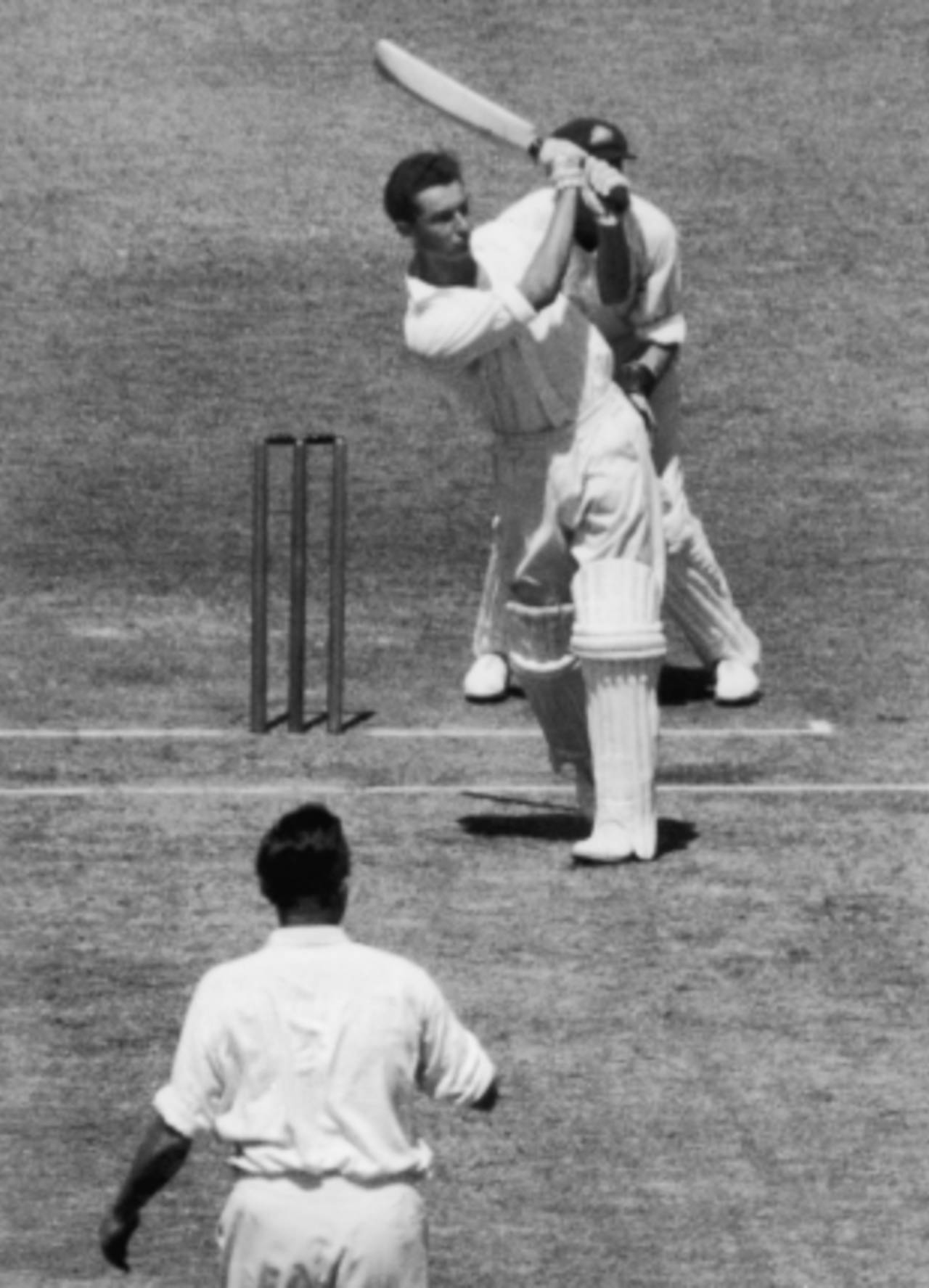Reg Simpson was acknowledged to be one of the finest players of fast bowling England have ever had, so much so that when their batsmen were being terrorised by Australia's Lillee and Thomson in the seventies and West Indies' Roberts, Holding et al in the eighties and nineties journalists beat a path to his door to ask him what they should do.
"Back and across" was the Simpson mantra as he stood tall, still and bare-headed against the fastest bowlers of his day and he was still repeating it in his eighties as he demonstrated precisely what he meant with a walking stick instead of a bat in his hand.
Simpson, who has died at the age of 93, played in 27 Tests between 1948 and 1955, scoring 1401 runs at an average of 33.35, but it would have been many more if England had not had such a wealth of batting talent, including Len Hutton, Cyril Washbrook, Bill Edrich, Denis Compton, Peter May, Colin Cowdrey and Tom Graveney.
He shared in two record opening partnerships for England - 147 with Hutton against New Zealand
at the Oval in 1949 and 212 with Washbrook against West Indies
at Trent Bridge in 1950 - and he made four centuries, the most memorable of them his 156 not out against Lindwall and Miller
at Melbourne in 1950-51 which enabled England to beat Australia for the first time in 13 years.
Reginald Thomas Simpson was born at Sherwood Rise in Nottingham in 1920 and was only 13 when he shared in a remarkable opening stand of 467 with one Henry Betts in a house match at Nottingham High School. He left school at 16 to become a police cadet but continued to score runs for the police team and when he was 20 announced himself at Trent Bridge by scoring 134 not out for Nottinghamshire against the RAF.
By then, though, the war was upon us and after training as an RAF pilot in Arizona he was posted to India where he was to play his first half-dozen first-class matches - two for Sind in the Ranji Trophy, two for a Services XI and two, before anyone had heard of political correctness, for the Europeans against the Hindus and the Parsees.
He returned home in 1946 with an ambition to become an airline pilot but he had played alongside the likes of Compton and Edrich, Wally Hammond and Joe Hardstaff in India and within four days he was making his championship debut for Nottinghamshire against Somerset.
Simpson was 26 but he was soon making up for lost time. He made his England debut on the 1948-49 tour of South Africa and was at the other end when Compton played one of the most amazing innings of all time for MCC against North Eastern Transvaal at Benoni. He hit 300 in a minute over three hours, including 42 fours and five sixes, in a third-wicket partnership of 399. Reg had to content himself with 130 not out.
It was a similar story at Trent Bridge in 1954. Simpson, who had made a century in his first home Test against New Zealand at Old Trafford in 1949 and become the first Nottinghamshire batsman to score a Test century at Trent Bridge against South Africa in 1951, scored another hundred but he was to be upstaged by Compton's 278.
Simpson was to score 30,546 runs, 23,088 of them for Nottinghamshire, and make 64 hundreds, 10 of them double-centuries, in a first-class career stretching from 1944 until 1963 but Trent Bridge devotees of a certain age (and they include this writer) remember him just as well for an over he bowled to Wilf Wooller, the irascible Glamorgan captain, in 1951.
There were 10,000 spectators in the ground on a Saturday afternoon in June and most of them were slow hand-clapping when Wooller, who had gone in at 212 for 4 on what was then a typical Trent Bridge featherbed, and Willie Jones proceeded to score 12 off the next 15 overs, nine of which were maidens.
Then Simpson, in his first year as Nottinghamshire captain, made his feelings known. He took the ball and astonished umpires and spectators alike by bowling underarm. The first ball was lobbed up to Wooller who just patted it back. The next five almost crept along the ground and Wooller blocked them all, taking off his gloves and sarcastically mopping his brow after each one.
Wooller called the incident "bad taste." Simpson, who took himself off after one over, said the Glamorgan batting was a farce so he produced some farcical bowling to match. It was the start of a running feud which said much about Simpson who, for all his elegance and calm demeanour, could be just as bloody-minded as Wooller.
Simpson, like Wooller, was one of the last of the so-called "shamateurs" in that he was not officially paid to play cricket but had a deal with Gunn and Moore, the Nottingham bat-makers, where he was to become a director. He was also chairman of the Nottinghamshire cricket committee and president of the club.
